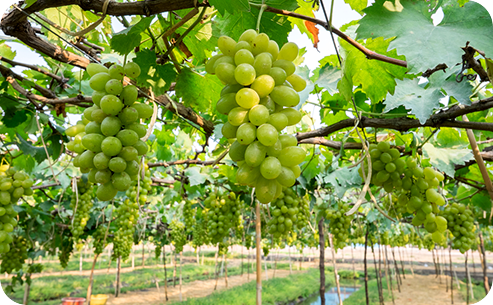fertilizer, Grapes cultivation

Agriculture plays an important role in sustaining the life of the increasing human population since ancient times. Modern agriculture has paved the path to come up with innovative methods to enhance crop yield by using fertilizers and pesticides. Farmers often confuse fertilizers with pesticides as they are two different things that serve their own purpose. Fertilizers are used to boost crop growth, whereas pesticides are used to combat diseases, weeds, and harmful insects that might damage the yield of agricultural production.
But, over time, pesticides are being refined to create less environmental damage and reduce the ill effects of chemical pesticides. As grapes are one of the crops that need to be perfectly grown with careful application, using any kind of pesticides or fertilizer can harm crop production.
In order to ensure that the new plantings and mature grape vines are the healthiest they can be, the right type of fertilizer for grapes must be chosen for their healthy growth.
Let’s learn how to use fertilizer for grapes:
It may be time to fertilize your grape vines if the fruit is lacking in quality or the vines appear to be lacking in luster. Before applying any fertilization method, you must first test the soil and tissue condition of your field semiannually or annually. Fertilization methods need to be tailored to your soil's test data, tissue analysis, and crop history since no two fields are the same. When the plant is starting to grow, it needs more N to develop the leaf surface and photosynthesize. Potassium is essential to the development of well-formed grapes during fruit growth. As a major carrier of nutrients, phosphorus is always required. Furthermore, Phosphorus assists the plant in developing healthy roots during the first few years after planting. Many factors determine the type and quantity of fertilizer required in a vineyard. It is crucial to consider the type of soil, the age of the plant, the training system, environmental conditions, as well as the variety and type of vineyard. Plants have different nutrient requirements at different stages of their development. It is important to remember that every field is different and requires a different approach. Before applying any fertilization method, it is essential to check the soil's condition and pH. You can consult your local licensed agronomist to implement a proper method of fertilization.
How do fertilize grapes?
In the spring, grapevines need nitrogen to jump-start their rapid growth, just like almost every other plant. If you wish to feed your vines with manure, apply it in January or February. It is also beneficial to grapevines to consume zinc. Plants need it for many functions, and if it is deficient, the shoots and leaves will be stunted, resulting in a lower yield. Zinc should be applied a week before blooming or when the vines are fully bloomed in spring. After pruning your grapes in early winter, you can brush a zinc solution on the fresh pruning cuts. Potassium deficiency is usually characterized by decreased shoot growth, chlorosis (yellowing), and summer burn. As soon as the vines begin producing grapes in the spring or early summer, fertilize them with potassium fertilizer.
